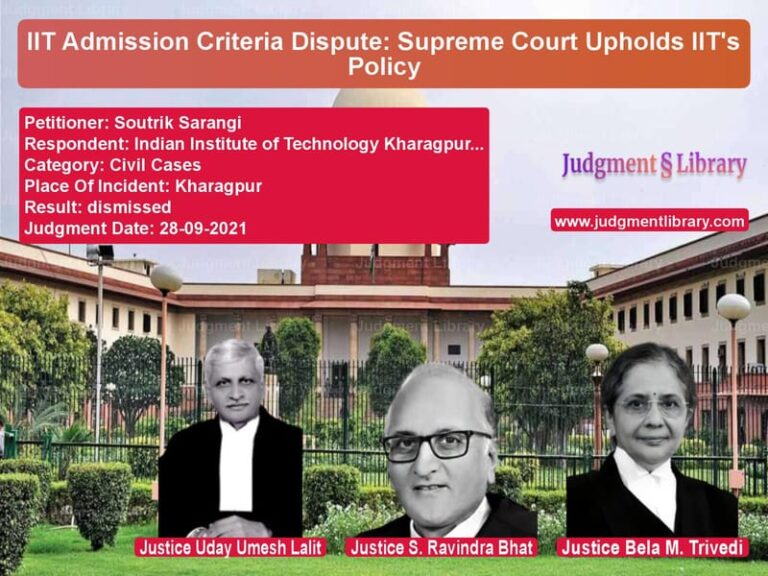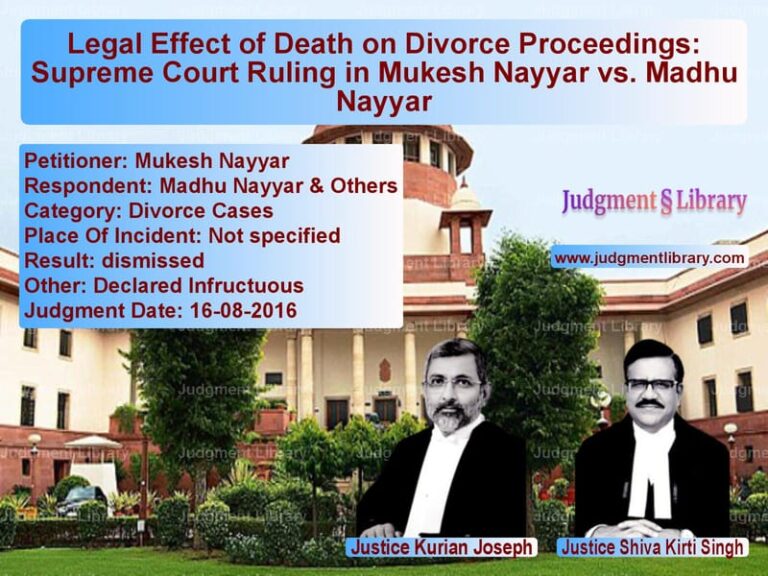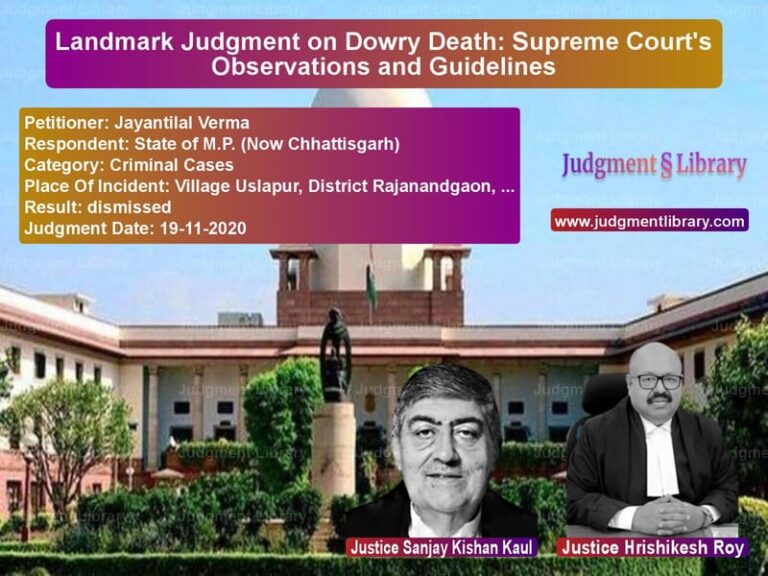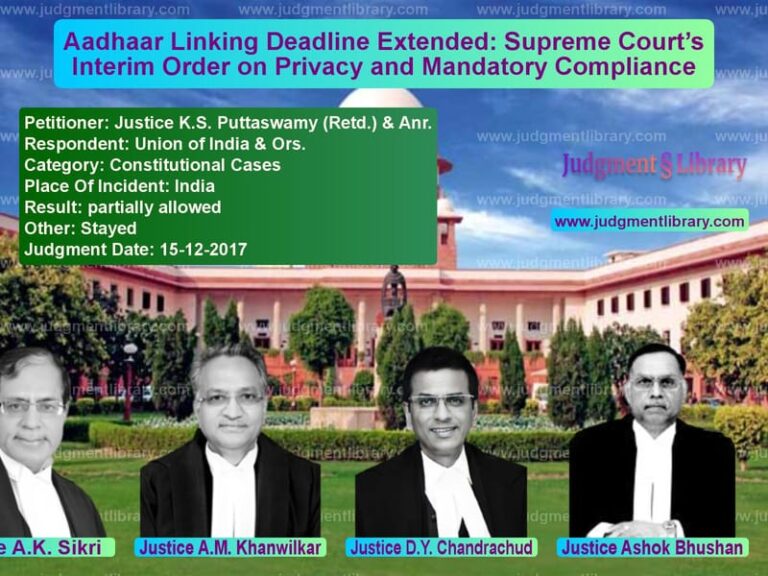Landmark Judgment on Heinous Crime: Supreme Court Modifies Death Sentence to Life Imprisonment
The case of Sachin Kumar Singhraha v. State of Madhya Pradesh is one that raises critical questions on circumstantial evidence, sentencing principles, and the legal test for imposing capital punishment. The Supreme Court of India, in its decision dated March 12, 2019, deliberated on the conviction and sentencing of the accused, who was found guilty of heinous offenses, including the sexual assault and murder of a five-year-old child. This case highlights the judiciary’s approach to handling crimes against minors while also assessing whether the death penalty is the appropriate form of punishment.
The trial court had initially sentenced the appellant to death, which was confirmed by the High Court. However, the Supreme Court, upon appeal, reconsidered the sentencing and commuted the death penalty to life imprisonment for a minimum of 25 years without remission. The judgment provides a detailed analysis of the legal standards applicable in cases based on circumstantial evidence and the interpretation of the ‘rarest of rare’ doctrine.
Case Background
On February 23, 2015, the victim, a five-year-old girl studying in L.K.G., was supposed to be dropped off at school by her uncle, PW4. The accused, who owned and drove the vehicle in which the victim was last seen, assured PW4 that he would safely take her to school. However, the child never reached her school, leading to a frantic search by her family. Days later, her body was found in a well, and forensic examinations confirmed that she had been sexually assaulted and murdered.
The prosecution charged the accused under Sections 363, 376(A), 302, and 201(II) of the IPC and Section 5(i)(m) read with Section 6 of the POCSO Act. The trial court convicted the accused and awarded the death penalty, which was subsequently upheld by the Madhya Pradesh High Court. The appellant challenged the decision in the Supreme Court, leading to the present judgment.
Petitioner’s Arguments
The defense, represented by Senior Advocate Shri Mrigandra Singh, raised several critical contentions regarding the prosecution’s reliance on circumstantial evidence:
- The prosecution’s case was primarily based on the last-seen theory, which, according to the defense, was not conclusively proven.
- There were discrepancies in witness testimonies, particularly those of PW4 and PW5, leading to doubts regarding the credibility of the evidence.
- The recovery of the body and school bag at the instance of the accused should not be admissible since procedural lapses occurred during the investigation.
- The prosecution failed to establish an unbroken chain of circumstances linking the accused to the crime beyond reasonable doubt.
- In the alternative, the defense submitted that the case did not fall within the ‘rarest of rare’ category and, therefore, the death penalty was unwarranted.
Respondent’s Arguments
The prosecution, representing the State of Madhya Pradesh, countered the defense’s claims and asserted that the evidence against the accused was overwhelming:
- The victim was last seen alive with the accused in his vehicle, and there was no other plausible explanation for her disappearance.
- The accused had provided a false explanation regarding dropping the victim at school, which was disproven by school records.
- The recovery of the victim’s body and school bag at locations disclosed by the accused further corroborated his guilt.
- The forensic evidence confirmed sexual assault and homicide, making it a particularly gruesome crime.
- The lower courts had correctly applied the ‘rarest of rare’ doctrine, justifying the imposition of the death penalty.
Supreme Court’s Observations and Ruling
The Supreme Court carefully analyzed the evidentiary record and reiterated key legal principles regarding circumstantial evidence. The Court observed:
“The circumstances from which the conclusion of guilt is to be drawn must be fully established and should not leave any reasonable ground for an alternative hypothesis consistent with the innocence of the accused.”
In evaluating the last-seen theory, the Court found that PW4’s testimony was credible and consistent. Moreover, the forensic evidence corroborated the prosecution’s case, leaving no room for doubt regarding the accused’s involvement.
However, the Court critically examined the sentencing aspect and referred to established precedents on the imposition of the death penalty. It noted:
“Life imprisonment is the rule, and the death penalty is the exception. If the Court itself feels some difficulty in awarding one or the other, it is only appropriate that the lesser punishment be awarded.”
The Court reasoned that while the crime was heinous, the possibility of reformation could not be entirely ruled out. Considering the appellant’s background and lack of prior criminal record, the Court commuted the death penalty to life imprisonment with a minimum term of 25 years without remission.
Conclusion
The Supreme Court’s ruling in this case underscores the necessity of maintaining a balance between deterrence and reformation in criminal sentencing. While the conviction was upheld, the Court exercised caution in applying the death penalty, reinforcing the principle that capital punishment should be reserved for the ‘rarest of rare’ cases. This judgment serves as a significant precedent in child sexual assault and murder cases, guiding future considerations in similar matters.
Petitioner Name: Sachin Kumar Singhraha.Respondent Name: State of Madhya Pradesh.Judgment By: Justice N.V. Ramana, Justice Mohan M. Shantanagoudar, Justice Indira Banerjee.Place Of Incident: Maihar, Madhya Pradesh.Judgment Date: 12-03-2019.
Don’t miss out on the full details! Download the complete judgment in PDF format below and gain valuable insights instantly!
Download Judgment: Sachin Kumar Singhra vs State of Madhya Prad Supreme Court of India Judgment Dated 12-03-2019.pdf
Direct Downlaod Judgment: Direct downlaod this Judgment
See all petitions in Murder Cases
See all petitions in Rape Cases
See all petitions in Bail and Anticipatory Bail
See all petitions in Juvenile Justice
See all petitions in SC/ST Act Case
See all petitions in Judgment by N.V. Ramana
See all petitions in Judgment by Mohan M. Shantanagoudar
See all petitions in Judgment by Indira Banerjee
See all petitions in partially allowed
See all petitions in Modified
See all petitions in supreme court of India judgments March 2019
See all petitions in 2019 judgments
See all posts in Criminal Cases Category
See all allowed petitions in Criminal Cases Category
See all Dismissed petitions in Criminal Cases Category
See all partially allowed petitions in Criminal Cases Category







